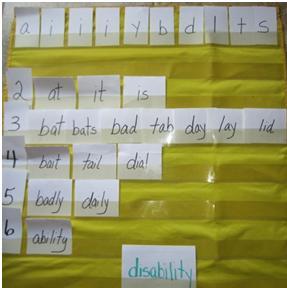What?
When?
During or after reading.
Why?
Making Words fosters high-order thinking skills and requires students to apply phonemic learning. This strategy builds holistic understanding of language by exploring how sounds form words and words form ideas. The game-like elements make learning domain-specific vocabulary (Tier Three) words fun and easy.
How?
Materials needed:
- Index cards
- Scissors
- Pocket chart
- Letter strip with secret word
Steps:
- Choose your vocabulary words.
- Decide what the “secret” word will be. It should be a Tier Two or Tier Three word that reflects students’ reading levels and interests, the theme of the central text, and the letter-sound patterns necessary to sort the words.
- Make a list of shorter words that can be made from the letters of the secret word (e.g. disability: at, it, is, bats, bit, bay, bait, tail, sail, ability).
- From the shorter words, pick a sub-list that includes
- Words you can sort for the spelling pattern(s) you want to emphasize
- Longer and shorter words so the lesson can be differentiated
- Words that can be changed through minor changes in letter placement to demonstrate the importance of letter order (e.g., bran/barn)
- Proper names to demonstrate the use of capital letters
- Keep an ordered list of the shorter words. Create an index card for each letter and for each word in the ordered list of words. Write a corresponding capital letter on the back of each letter card.
- Create additional word order lists as necessary to reflect letter patterns, letter order or inclusion/omission of letters.
- Write the letters of the secret word on a sentence strip, vowels first, consonants second, so as not to give away the secret word.
- Make a copy of the letter strip for each student.
- Have students cut apart each letter.
- Place index cards with the same letters on a pocket chart.
- Challenge students to make specific words by arranging the letters at their desks. For an example of this process, see sample Make Words activity.
- If someone figures out the secret word, let that student come to the front of the class and make it using the pocket chart. If students do not identify the secret word, reveal the word on the pocket chart and have students make it at their desks.
- Reread the segment of the central text where the secret word is found.
- Define the word together, using context clues from the central text
- Challenge students to see what other words they can create with the letters in the secret word.
- Challenge students to write a complete sentence using words made from the secret word.
English language learners
Adapt Making Words for English language learners by using cognates. Cognates can then be used to create word lists and, ultimately, for sorting activities.
Connection to anti-bias education
Select words related to anti-bias and social justice themes, as seen in the Sample Make Words activity, This strategy helps students understand vocabulary and become flexible, independent problem solvers.
Sample Make Words activity
Secret word: disability
- Take two letters and make the word at.
- Change one letter and make the word it.
- Change the “t” to an “s” to make is.
- Take three letters and make the word bat.
- Add an “s” to bat to make bats.
- Change one letter and make the word bad.
- Change bat to tab. I put a tab on my book where I stopped reading.
- Make a three-letter word: day.
- Change one letter in “day” to make lay. Lay your paper flat on the desk.
- Make a three-letter word: lid. I took the lid off the jar.
- Now, we are going to make some four-letter words. Make the word bait. I needed bait to go fishing.
- Make the four-letter word tail.
- Change one letter in tail to make it sail.
- Make another four-letter word: dial. I turned the dial on the radio.
- Let’s make some five-letter words. Take five letters and make the word badly. Our league bowled badly today.
- Now, spell another five-letter word: daily.
- Try a six-letter word: ability. You have the ability to do anything!
- Every making-word lesson has a secret word—a word than can be made with all the letters. Take a minute and see if you can figure out the secret word.
